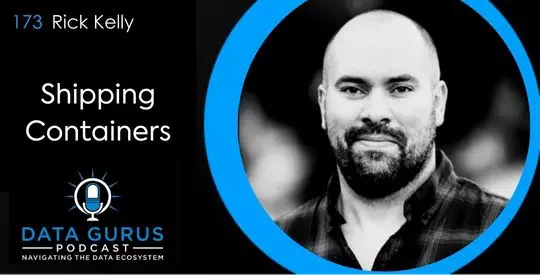Podcast: Play in new window | Download
Welcome to another fascinating episode of Data Gurus! Sima is happy to have Rick Kelly, the Chief Product Officer of Fuel Cycle, joining her on the show today!
In this episode, Rick explains how he got to where he is today and discusses Fuel Cycle’s unique approach of linking with multiple API partners to offer different capabilities for specific communities to utilize and positioning itself as the Salesforce for communities.
Bio:
Rick is currently the Chief Product Officer at Fuel Cycle, where he has worked since 2014. Before his tenure at Fuel Cycle, he worked at an early-stage health tech startup, taught political science, and worked in market research.
Outside of work, Rick volunteers with the bleeding disorders community and obsessively learns about food and cooking.
How Rick got to where he is in his career
Rick started his career in market research by accident. When he left grad school in 2009, the company he was going to work for went insolvent. So he got referred to a sample company and started working in market research. He left market research to spend a year teaching political science and then took some time off to travel to India, where he worked for a tech startup based in San Francisco. After moving back to the US in a hurry because his baby had a rare bleeding disorder, he emailed a former colleague and ended up working at Fuel Cycle.
The State of Communities
The State of Communities was the title of Rick’s presentation at an IIEX Conference in April 2022. Fuel Cycle is known for its research communities, so they are interested in how those communities get used, different use cases, and what leads to the adoption of communities. They run a study each year amongst their research practitioners to better understand how they utilize their communities. That develops their content and informs their product development and where they invest on their platform.
Communities
Most of Fuel Cycle’s customers are brands, big enterprises, and licensing communities over the long term. In many cases, they put three-year-plus deals together to help their customers stay engaged with key audiences. So when they talk about Fuel Cycle, they take it beyond communities and call it the Market Research Cloud because they enable their customers to maintain a constant connection with their key audiences. They also help accelerate decision-making with their suite of solutions and integrated partner platforms.
Integrating with partners
Fuel cycle has a platform in a robust set of APIs that allows them to integrate with more than forty partners.
A developer platform
A decision got made to treat fuel Cycle as a developer platform. They decided to go API first and partner extensively to deliver broader functionality to high-demand researchers.
More research
Fuel Cycle believes that the world needs more research. They advocate for that.
Bad business decisions
Bad business decisions get made often. It usually happens because those decisions have neither been validated by customers nor prospective customers.
More efficient businesses
Businesses will run more efficiently if insights are made more accessible to decision-makers. That will also reduce the existing economic dead-weight loss in the world.
The world needs more research
The world needs more research. That means market research needs to scale beyond the insights department to be truly effective.
Use cases
Use cases are growing dramatically outside the core research persona.
Delivering value
Research practitioners do a challenging job. Rick believes that the best way to deliver value to an organization is to unchain some insights practices from the insights team and push more self-serve capabilities out to stakeholders.
Some of the challenges related to communities
A community is a program. So it has to be well run and maintained. If you use a community just to run surveys, you are probably over-investing in it. Communities need to be exercised, so they require a regular cadence of information. You also have to close the feedback loop and tell people how their information gets actioned on.
The most important thing for communities
The most important thing for communities is to feed and grow them steadily.
Successful customers
The customers of Fuel Cycle who tie communities into their business systems tend to be exceptionally successful.
Insights are more accessible
Insights are more accessible now, so more and more organizations are using them to make decisions.
Shipping containers
Growth in global trade exploded in the 1960s due to the introduction of shipping containers. Shipping containers standardized the packaging of goods and enabled ports to become more efficient. About 60% of all trade between countries today can be attributed to adopting a common shipping infrastructure (containers).
Standardization
The world needs more research, better decisions, and more decisions informed by consumer feedback. Standardization is ultimately like shipping containers because it is essential for obtaining the necessary volume and accuracy. That’s why insights need to be more accessible.
Data use
Most effective organizations take measures to make data use acceptable.
Better decisions
Insights should be forward-looking and used to inform as many decisions as possible.
Motivation
There are three core anchors of motivation within research communities:
- Utilitarian (financial incentives)
- Community orientation and common interest
- Brand impact
Communities evolve
Communities evolve, so the value proposition offered to participants has to get revisited often.
Things that should not get done in a community
Some things should not get done in a community. That is why Fuel Cycle has panel partners to enable research with customer audiences within a community and prospects in a panel.
Links:
Email me your thoughts!
Sima@Infinity-2.com
Connect with Rick Kelly




